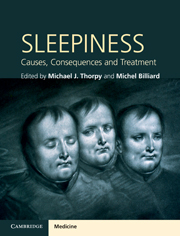Book contents
- Sleepiness
- Sleepiness
- Copyright page
- Contents
- Contributors
- Foreword
- Preface
- Abbreviations
- Section 1 Introduction
- Section 2 Sleep Disorders and Excessive Sleepiness
- Section 3 Medical, Psychiatric and Neurological Causes Of Sleepiness
- Chapter 25 Depression and sleepiness: a chronobiological approach
- Chapter 26 Aging, Alzheimer's disease and sleepiness
- Chapter 27 Excessive daytime sleepiness in Parkinson's disease
- Chapter 28 Myotonic dystrophy and sleepiness
- Chapter 29 Post-traumatic sleepiness
- Chapter 30 Genetic disorders and sleepiness
- Chapter 31 Brain tumors, infections, and other CNS causes of sleepiness
- Chapter 32 Hypothyroidism and other endocrine causes of sleepiness
- Chapter 33 Toxic and metabolic causes of sleepiness
- Chapter 34 Excessive sleepiness due to medications and drugs
- Section 4 Therapy of Excessive Sleepiness
- Index
Chapter 25 - Depression and sleepiness: a chronobiological approach
from Section 3 - Medical, Psychiatric and Neurological Causes Of Sleepiness
Published online by Cambridge University Press: 04 February 2011
- Sleepiness
- Sleepiness
- Copyright page
- Contents
- Contributors
- Foreword
- Preface
- Abbreviations
- Section 1 Introduction
- Section 2 Sleep Disorders and Excessive Sleepiness
- Section 3 Medical, Psychiatric and Neurological Causes Of Sleepiness
- Chapter 25 Depression and sleepiness: a chronobiological approach
- Chapter 26 Aging, Alzheimer's disease and sleepiness
- Chapter 27 Excessive daytime sleepiness in Parkinson's disease
- Chapter 28 Myotonic dystrophy and sleepiness
- Chapter 29 Post-traumatic sleepiness
- Chapter 30 Genetic disorders and sleepiness
- Chapter 31 Brain tumors, infections, and other CNS causes of sleepiness
- Chapter 32 Hypothyroidism and other endocrine causes of sleepiness
- Chapter 33 Toxic and metabolic causes of sleepiness
- Chapter 34 Excessive sleepiness due to medications and drugs
- Section 4 Therapy of Excessive Sleepiness
- Index
Summary
Keywords
- Type
- Chapter
- Information
- SleepinessCauses, Consequences and Treatment, pp. 279 - 291Publisher: Cambridge University PressPrint publication year: 2011
- 1
- Cited by

